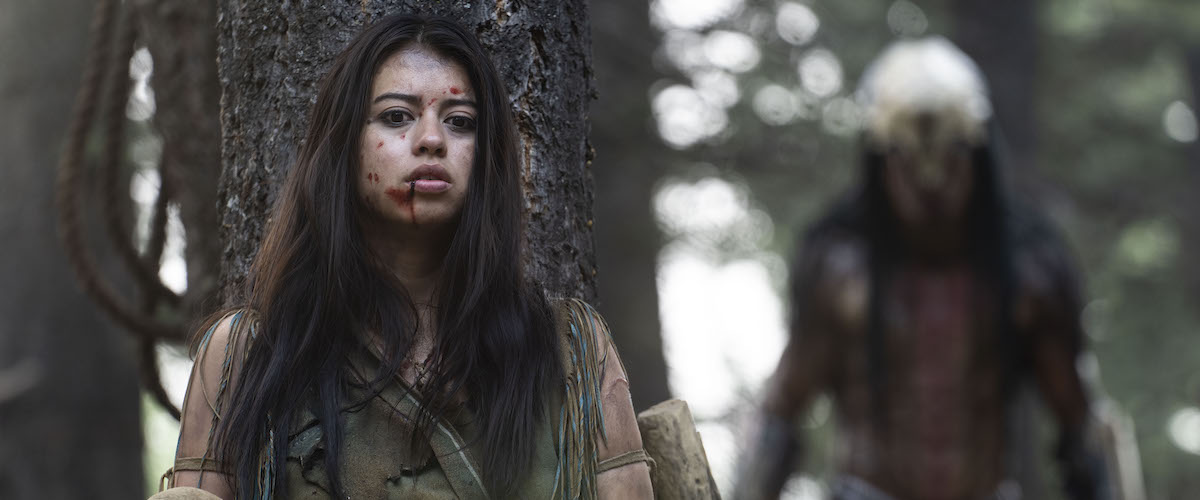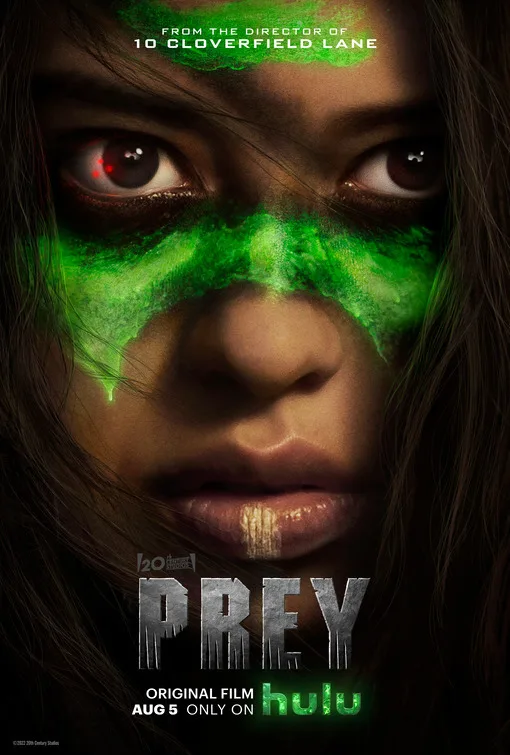“Prey” is worth spending the money to see on the biggest screen possible. The wide open spaces of Alberta look fantastic, there’s plenty of monster mayhem and action, and the striking score by Sarah Schachner deserves to be blasted from the largest speakers available. So, why is Disney dumping an entry in the popular “Predator” series on Hulu in the middle of the summer? The original “Predator” starring Arnold Schwarzenegger turns 35 this year; what better way to celebrate than with a prequel that’s better than any of its sequels? The marketing team could have had a field day promoting this connection. So why is this film, like Disney+’s “Turning Red” before it, going straight to streaming with no simultaneous theatrical presence?
Was it because director Dan Trachtenberg’s sci-fi actioner didn’t have any major stars (besides the Predator, of course)? Was it because the screenplay by Patrick Aison takes place in 1719, making this a period piece? Or was it due to the fact that the protagonist is a woman and her kin are Native Americans, both of which buck the trend for movies like this? Considering the recent cancellations of films scheduled for upcoming release, I suppose I should be thankful that “Prey” can be seen anywhere, including on services to which I do not subscribe. This is not to say that streaming services are bad, just that I always feel itchy recommending movies you need a contract to see. Plus, this deserves a theatrical release.
But I digress. “Prey” bills itself as an origin story of the first Predator alien to appear on Earth. This one is fitted with slightly retro versions of the weapons wielded by the late actor Kevin Peter Hall in the first film. The Predator’s modus operandi is the same, however: it is a hunter and it’s looking for trophies of prey. This gives the creature a kindred spirit of sorts in Naru (Amber Midthunder), a young warrior who wishes to hunt like the males in her tribe, including her brother, Taabe (Dakota Beavers). Naru is teased by the guys, who state that hunting is men’s work, but we learn she can hold her own in a fight. She’s twice as tough as she looks, and three times more observant than the others. Naru is the one who first notices that there’s a new creature on their land. Perhaps it might have something to do with that blazing streak of fire she saw in the sky earlier.
While on the hunt to find a lion that’s been prowling about, Taabe barely tolerates Naru tagging along. They have an easygoing sibling relationship that Midthunder and Beavers create almost immediately in their first scenes. Their bond adds to our worries once the real danger appears. Naru notices a skinned snake and prints that do not belong to a known entity. “Something scared off that lion,” she tells Taabe, but he is in no mood for her claim that it is a “monster from childhood stories.” Meanwhile, the Predator works its way up the animal chain, teaching a pugnacious wolf a lesson about selling woof tickets by pulling out its spine. Naru finally gets to see it when it ruthlessly guts the bear that was chasing her and her faithful mutt.
The scene with the bear is so cleverly staged that one wishes “Prey” hadn’t given us a good look at the Predator beforehand. As it yanks the bear from its pursuit, lifting it up for the kill, the invisible Predator is painted into view by an outpouring of blood. Naru sees this and runs like Hell. So begins a series of expertly crafted chase scenes, with our antagonist employing familiar and new ways to eviscerate its victims. There’s also a callback to one of the original film’s best lines: “if it bleeds, we can kill it.” Bleed it does, with a neon green blood that, at one point, Naru uses as war paint.
Adding another element of danger (as well as fresh meat for viewers hungry for Predator-based carnage) is a slew of uncouth French fur trappers. When Naru stumbles upon a field of skinned buffalo, she prays over them, thinking that this is the monster’s handiwork. Soon she realizes it’s man, that other evil predator, who is responsible. Even though they agree with Naru that something otherworldly is out there, the trappers are even more villainous than the Predator. So we’re not sorry when they start getting splattered.
“Prey” is a worthy successor to Ah-nuld’s original, even though there are no “choppas” for anyone to get to in 1719. Naru deserves to be added to the list of tough characters who can hold their own against the Predator. She uses brains and brawn in equal measure to handle all of her foes, dispatching them with gory efficiency. Nature also proves a cruel adversary, but she’s ready for that as well. The film creates a portrait of her Comanche nation without othering them—they are the heroes of the story and their village teems with a sense of camaraderie. Even though the film is mostly in English (a full Comanche language version was apparently also shot in tandem), it does not endanger our suspension of disbelief.
Despite the expected whine from immature males who haven’t seen the movie yet but are already deeming it “too woke,” “Predator” fans will not be disappointed by “Prey.” It’s a scary and fun amusement park ride that also elicits a surprisingly tender emotional response. When Naru finally let out the war cry she had previously been denied, I couldn’t help but cheer. It’s too bad I couldn’t do it with an audience full of equally excited viewers.
On Hulu tomorrow, August 5th.




















